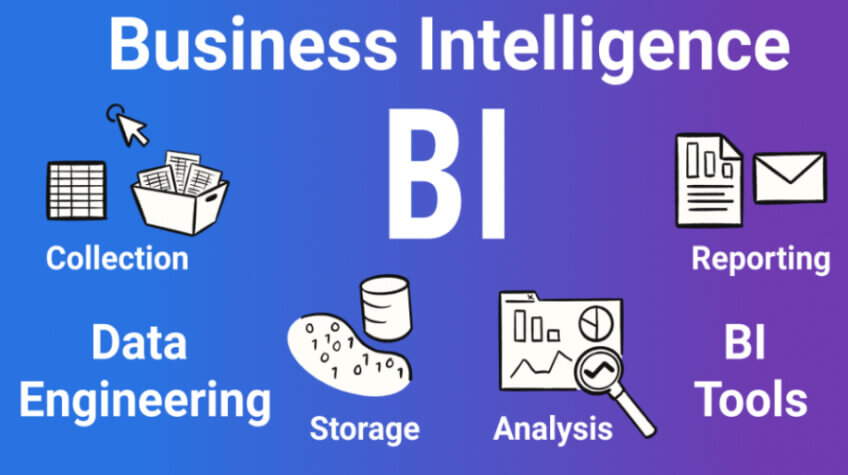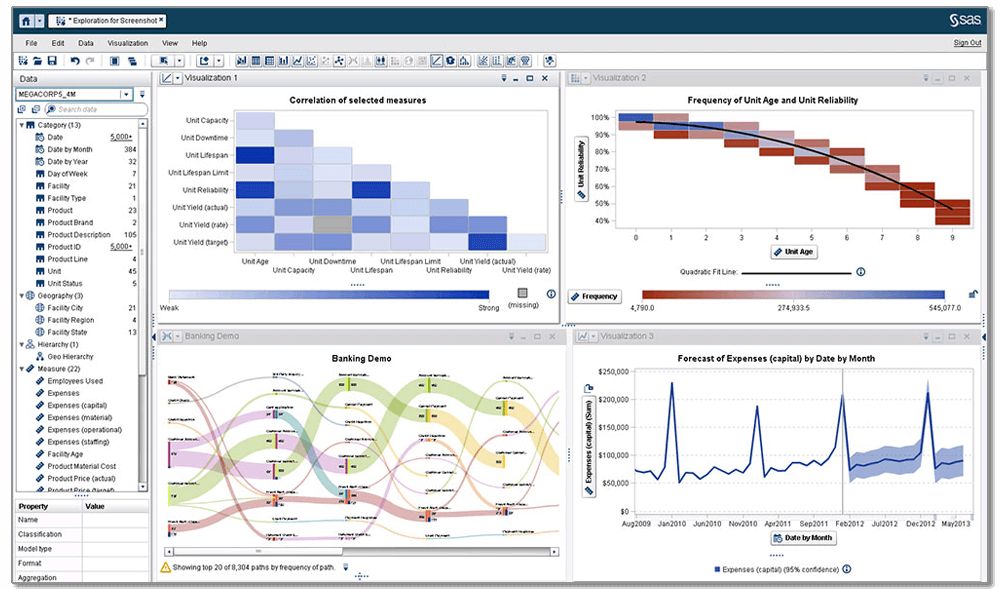
Organizations all over are using BI tools to turn data into insights and action. It can make reporting faster and more accurate, help identify trends in your industry and draw insights, give better customer experience, give sales intelligence help, aid in management and organization, establish benchmarking, manage performance, and increase ROI, among others. Is your organization ready to implement BI? If you have not implemented BI in your business yet, you are missing out on a lot. Find out the several ways in which BI can benefit your organization. Are you aware that data analytics can make decision making 5 times faster for your organization?
There are several reasons why organizations implement business intelligence software. But all have a common goal, i.e., to use the tool to turn data into insights and action.
Business intelligence helps organizations to better understand the forces shaping markets and businesses so that they can act on that knowledge. Organizations can thus gain a competitive edge while proactively addressing the needs of the customers.
Here are some ways in which your organization can benefit from business intelligence:
1. Make reporting faster and more accurate.
You can use templates or customized reports offered by BI tools to monitor KPIs using a variety of data sources. This also helps you act faster as the reports are produced in real-time and utilize the most relevant data.
The reports can be visualizations like tables, graphs, and charts. Some advanced BI tools can even generate interactive reports.

Since you are gathering relevant data within your business operations, you can gain valuable insights into your business.
For instance, a company that successfully implemented a BI solution to automate their reporting process is HelloFresh, a meal kit company. Reportedly, their marketing analytics team was able to save 10-20 working hours daily by automating their reporting processes on the Tableau platform.
2. Identify trends and draw insights.
BI analytics tools can be used for powerful data mining, the practice of searching patterns in data to recognize trends, and draw insights.
The process of data mining involves collecting, warehousing and storage, organization, analysis, and presentation. With the help of some BI software, you can carry out all of these steps.
Business Intelligence analyzes, processes, and provides big data that you can’t manage with weaker programs. Plus, it integrates with in-house databases, data warehousing solutions, and structured and unstructured data, giving easy access to crucial information and improved decision-making processes.
What’s more, you can effortlessly pick up on trends in company expenses, operations, client development, staffing, and more.
It is said that Germany’s XING, a career-based social networking platform that produces more than 50 million system events daily was able to significantly decrease the processing overhead of their transformation jobs and make the integration process simple by bridging and centralizing their numerous data systems.
It allowed the business to get real-time access to user behavior. Thus, they were able to make much quicker decisions on their product roadmap.
3. Enhance the customer experience.
BI tools allow you to understand customer behaviors and patterns. You can take customer feedback in real-time and use the information to retain consumers and reach out to new ones. You will also be able to identify buying patterns, which will help your customer support team to find out the customers’ needs and provide enhanced service.
CareLinx, a care network, which connected families to more than 300,000 in-home caregivers, was able to offer personal attention to all the families that use their product via Chartio, a HIPAA-compliant Business Intelligence tool.
Another company that is offering enhanced customer experience through BI is the world’s largest coffeehouse chain, Starbucks. The company uses the Loyalty Card Program to organize and analyze the multitudes of data about their consumers.
The data is then used to find out the purchases and offers an individual customer may be interested in. Also, their push messages and other alerts entice consumers via their smart devices.
4. Boost operational efficiency.
BI software merges multiple data sources, helping businesses in their overall organization. The time spent on tracking down information is reduced.
Employees and managers can use the time to produce accurate and timely reports. Since BI tools bring the most recent and accurate information, you can focus on both your short and long term goals and examine the impact of your decisions.
Coca-Cola Bottling Company solved this issue by incorporating BI in their strategy. Their BI team that was managing report for all sales and delivery operations was able to save more than 260 hours yearly by automating their manual reporting processes.
Through report automation, the sales team gains access to the customer relationship management data. Thus, it enables them to offer timely, actionable information, giving them a competitive advantage.
Moreover, statistics suggest that organizations lost an average of $15 million in 2018, owing to poor data quality. Clearly, boosting operational efficiency is a must!
5. Increase in revenue generation.
Generating more revenue is a vital goal for any business. Business Intelligence tools can produce data that can help the organization to ask better questions about why certain things occurred by comparing across different dimensions and spotting loopholes in sales.
Plus, revenue growth is more likely going to happen when:
- You are closely listening to your customers
- Keeping an eye on your competitors
- And improving your operations
And it goes without saying that business intelligence can help you with all of these things.
Related: 7 Most Used Free Tools for Promoting Small Business Online
Budding online retail that was seeing inconsistent sales were able to increase their sales by 24% after implementing BI methodologies and integrating a sales dashboard.
The company is scaling and the sales team continues to outdo its targets with the help of a more organized target-setting process and data-driven sales strategies.
Also, the e-commerce giant Amazon incorporates BI tools to personalize product recommendations. It is estimated that 35% of the company’s revenue comes from its recommendation engine.
But things don’t end there. Amazon also uses BI to help streamline their widespread logistics demands, such as meeting supply and demand.
6. Establishes benchmarking.
To achieve business success, you need fast thinking and effective decision-making. One of the common problems managers face is the inability to conduct a large-scale research project due to time constraints.
Here, BI tools can help you to do in-depth research and compile information for innovative decision-making easily.
You can use a benchmarking tool to measure your productivity, revenue, and overall success relative to that of your competitors. According to statistics, 64% of business leaders say that BI creates a substantial competitive advantage.
7. Manage performance.
You can track, manage, and implement performance goals with BI tools. Businesses usually input data-based goals like sales goals or target delivery time and then track progress daily.
BI tracking tools are effective and can be easily implemented for goal management, helping you boost performance significantly.
Another good news is that Business Intelligence also comes in handy when it comes to managing your remote employees and team members. With the new trends of rise in remote work, it’s a great idea to start using business intelligence tools sooner rather than later!
Here’s one example:
One US-based company that was seeing poor performance from their employees, incorporated HR software for HR analytics and BI for their department to analyze workforce behavior and performance.
By having a better overview of the problems that needed to be addressed, the company was able to increase productivity and overall performance. The analytics process enabled them to make more informed decisions and generate consistent HR reports that delivered accurate data.
8. Improve inventory management.
Your organization can even use business intelligence software for purchasing, locating, and inventory management. It helps you to generate reports specifying stockroom needs.
You can easily determine when to buy new inventory. BI further tracks when your inventory goes out, enabling you to better prepare for future purchase trends and decrease inventory waste.
9. Sales intelligence.
Your organization can’t take advantage of opportunities you are not aware of. Business intelligence can help you notice fleeting opportunities and offer the details that you can make use of.
The reports and data become really helpful when the need arises to back up your claims with hard data when making deals with potential clients. You will also be able to make quick sales decisions with the available real-time data and reports.
What’s more, you can spot trends in customer preferences, allowing your business to be the first to know what to offer customers and increase sales. As per reports, 51% of businesses that are leveraging data analytics are noticing financial growth.
For instance, Kidiliz Group (a children’s fashion company) that operates in more than 40 countries created and integrated 20 data flows to manage retails. It enabled them to analyze their sales and stock data and offer the best experience to their customers as they could streamline their in-store experiences.
10. Monitor fraud.
BI tools come with fraud monitoring and risk management features. You can figure out how likely it is that a person, transaction, or network is fraudulent by tracking patterns and monitoring data behavior, thus safeguarding your business.
Wrapping Up
Is your organization facing difficulty in gathering accurate data? Are you seeing a decrease in sales? Are your customers not satisfied with the services you provide? Business Intelligence can bring a solution to all these business problems you are facing.
In fact, the ROI for organizations using BI and analytics is 1300% on average. And of course, if you want to make a cut in the sea of competitors, using BI tools is the way to go.
Author bio:
Aanya Rachel is the Content Manager at The Address coworking space in Vadodara , Gujarat. She is passionate about sharing her knowledge, experience, and extensive research in this field. She writes on a wide range of topics related to coworking, growth of remote workers, startups and real estate.






